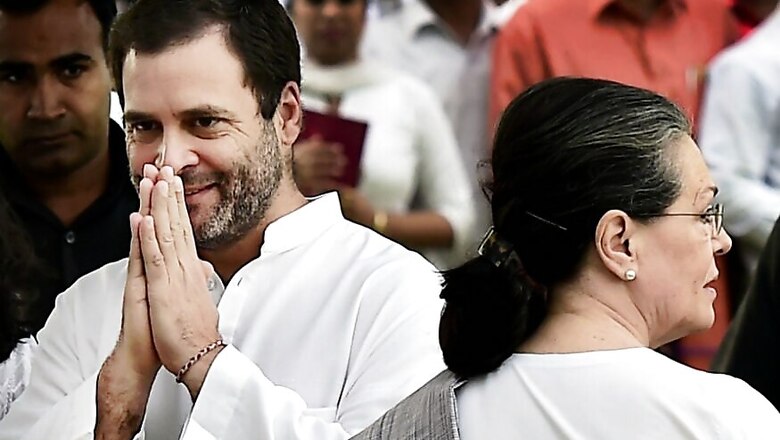
views
“Banuga jaldi banuga” is what Rahul Gandhi is said to have told his senior party colleagues during his interactions with them on Monday, this comes close on the heels of Sonia Gandhi's assertion of the impending change in the leadership of the Congress party. Truth be told, there has always been a certain inevitability about his elevation. It’s always been a question of when and not whether he will take over.
Rahul Gandhi will take over as the 60th president of the country’s oldest and till not very long ago the country’s biggest political party. He also takes over at perhaps the most difficult time in the party’s 132-year-old history.
Established in 1885, the Congress-ruled India for close to six decades, but today it is a pale shadow of the all-powerful, mighty juggernaut with an overpowering presence throughout the country, it’s now down to a mere 45 seats in the Lok Sabha. It is being increasingly pushed to the margins by a rampant BJP, which rules 18 of the country’s states, while the Congress accounts for a mere 5 states. That tally could come down on December 18 when the results of the Assembly elections in Gujarat and Himachal Pradesh are announced.
The Congress has a mountain to climb. It has been virtually wiped out of the Hindi heartland, once its core catchment area. In UP and Bihar, the party has never really recovered from the rout in 1989. In Bihar, it has managed to survive largely hanging onto the coat tails of Lalu Prasad’s RJD, and during the last Assembly polls courtesy its alliance with the JD (U) and the RJD.
In UP, the last time the party tasted power was in 1989 and its electoral performance has progressively deteriorated over the years. Even in its former bastions of Madhya Pradesh and Chhattisgarh, the last time it won the Assembly elections was over a decade ago.
The situation is no better in South India. Unlike 1977 when the party was routed in North India, it stood its ground and retained control south of the Vindhyas, it is struggling to retain a foothold in the South. The Congress shot itself in the foot, following its disastrous decision to divide Andhra Pradesh. In the process, it lost power in AP and failed to win Telangana. It now faces an uphill battle trying to retain power in Karnataka in next year’s Assembly elections. Kerala is one southern state where the party is still very much in the reckoning as it jostles with the Left for power.
In Tamil Nadu, it is struggling to find its feet and is dependent on its allies. The Congress has ceded ground to the BJP and the Sena in Maharashtra and is still to recover from its mauling during the last Assembly elections.
While the date of his elevation has still not been made public, a word coming out of the Congress is that it is likely to happen towards mid-November. Rahul Gandhi from all accounts is keen on getting elected and wants his elevation to happen after the culmination of the internal elections in the party. In all probability, he will be elected unopposed, as there is very little possibility of anybody contesting against him. The last time there was a contest for the post of the party president was in 2001 when Jitendra Prasada contested and lost against Sonia Gandhi.
Rahul’s elevation is expected to put an end, once and for all the notion of dual power centres existing within the party. It’s no secret that Rahul is far more comfortable working with the younger generation of leaders than with the old guard. Sonia Gandhi has led the Congress for the last 19 years and enjoys a larger than life presence in the party. She is a lot more conservative in her functioning, preferring to work with people who have been around for years.
Rahul, in contrast, prefers a much leaner team and is not averse to weeding out the dead wood. A case in point being the Uttarakhand elections. In the run-up to the polls, he made a case for the general secretary in charge of the state, a party veteran, to be replaced by a more agile and nimble-footed younger leader. Sonia dithered and eventually Rahul; did not press the point further.
Rahul political management team is hoping that his elevation will formally vest him with the confidence as well as the powers to restructure the party and position people. However, it’s a challenge that cuts both ways. Rahul will have to exhibit greater flexibility in his attitude and demonstrate that he has it in him to work with all ages and groups within his party.
As the Congress President, Rahul will be expected to take everybody along and utilise their skills sets to the advantage of the party. India's Grand Old Party has men and women of experience, that's been honed over the years in the heat and dust of the country’s politics, discarding them overnight may not be the wisest thing to do.
Rahul Gandhi's challenge in the short term is to ensure that the Congress gets back to winning elections. The party is yet to win a major election after 2014, barring Punjab, if Rahul can lead his party to victory in the forthcoming polls he will breathe fresh life into it.
In the long-term, he needs to rejuvenate the moribund party organisation. Rahul has off late shown signs of finding his feet and coming into his own, an electoral win will not only boost the confidence of his party but will help burnish his credentials both as leader of his party and a possible challenger to Narendra Modi. Rahul Gandhi clearly has much to think about as he awaits his elevation.
(The author is a senior journalist. Views are personal.)

















Comments
0 comment